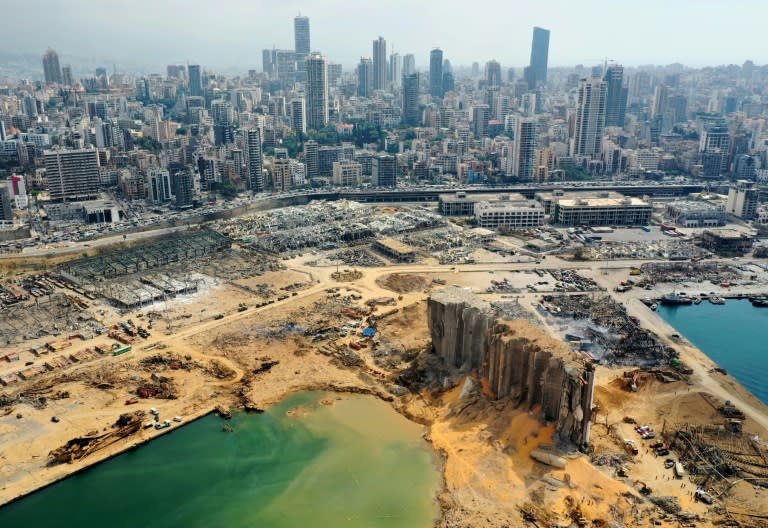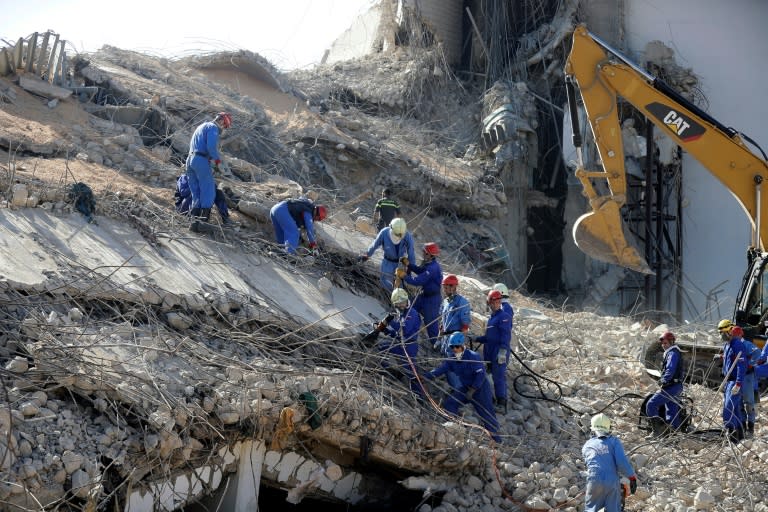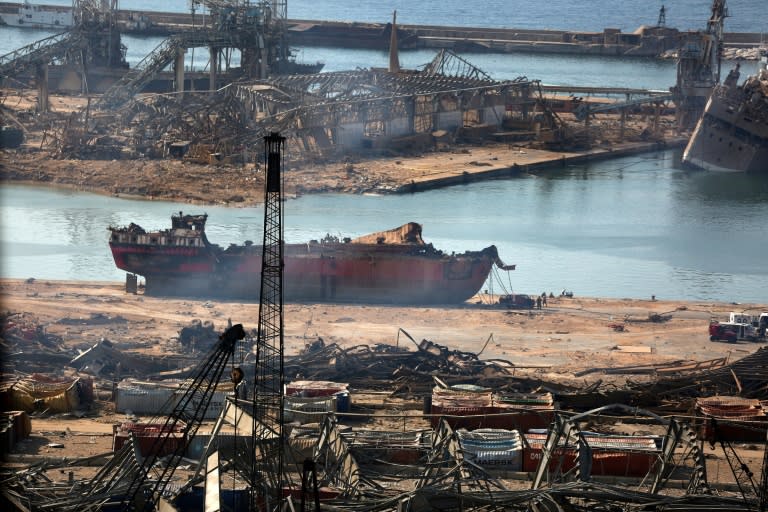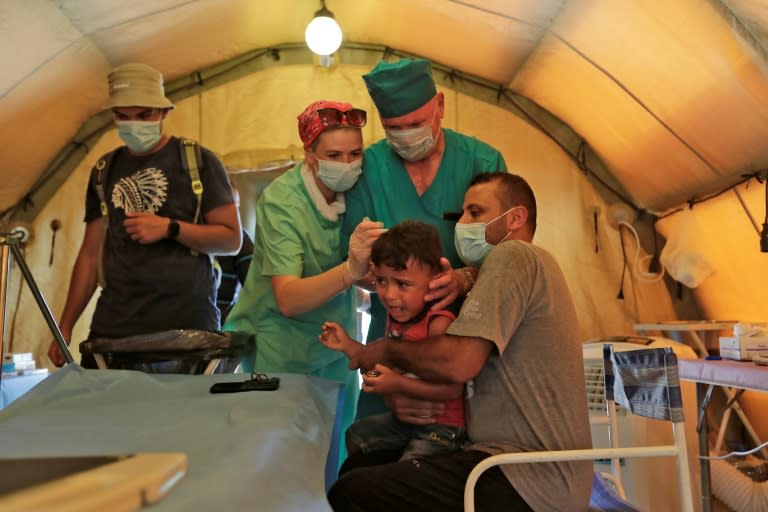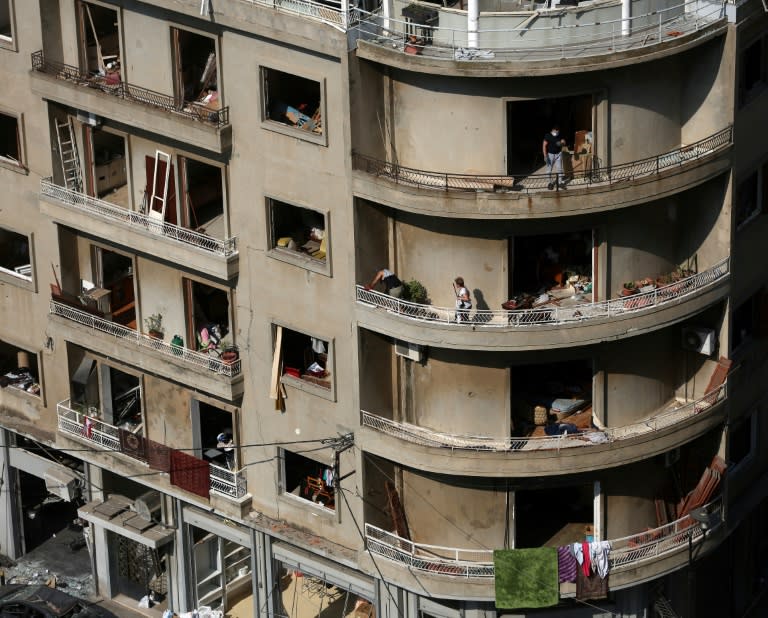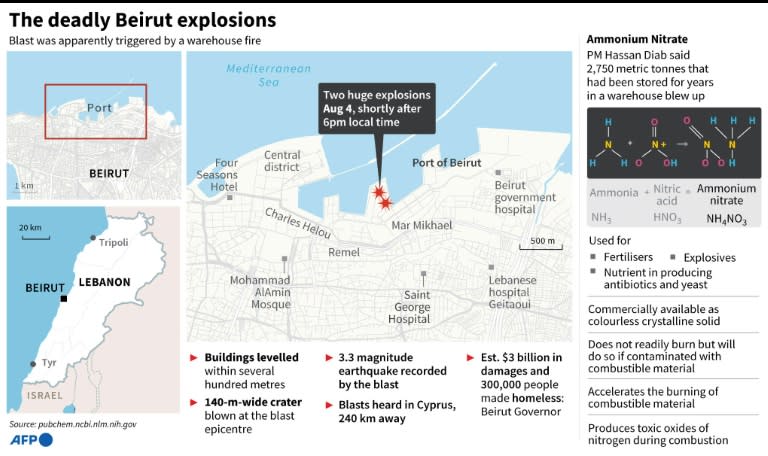By Eyad Kourdi, Niamh Kennedy and Shirin Faqiri, CNN
Published 11:56 PM EDT, Fri August 4, 2023
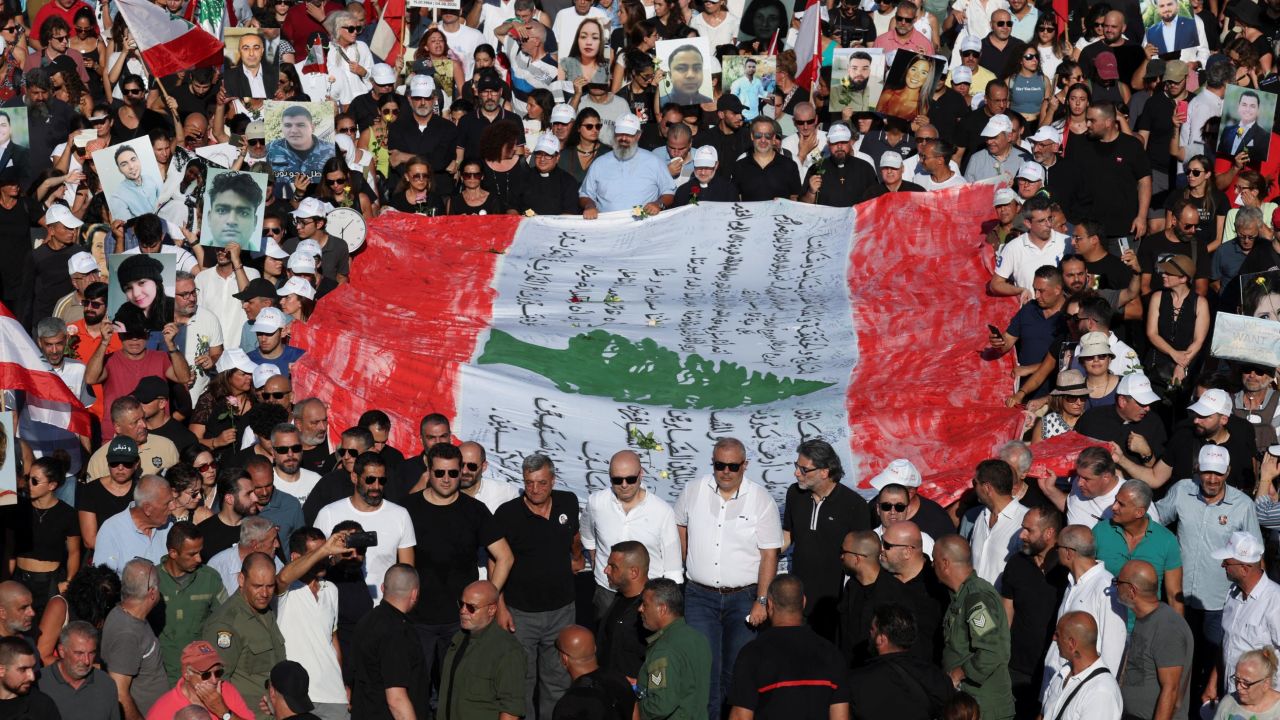
Protesters in Lebanon mark the three-year anniversary of the August 4, 2020, Beirut port blast.Mohamed Azakir/Reuters
CNN —
Hundreds of protesters gathered in Lebanon on Friday to mark the third anniversary of a devastating explosion that ripped through a port in Beirut, demanding accountability from officials over a disaster that remains shrouded in mystery.
Footage from Lebanese media showed demonstrators taking to the streets during a nationwide three-day mourning period and chanting slogans against politicians they accused of obstructing the investigation into the blast, which killed at least 200 people and injured 6,000 on August 4, 2020.
The incident at the Port of Beirut in the country’s capital was one of the world’s largest non-nuclear explosions.
The blast sent up a huge mushroom cloud-shaped shockwave, flipping cars and leveling buildings.
It registered as a 3.3 magnitude earthquake and was felt hundreds of miles away, as far as Cyprus.
Investigators attributed the blast to approximately 2,750 tons of seized ammonium nitrate that had been stored in a port warehouse since 2014.
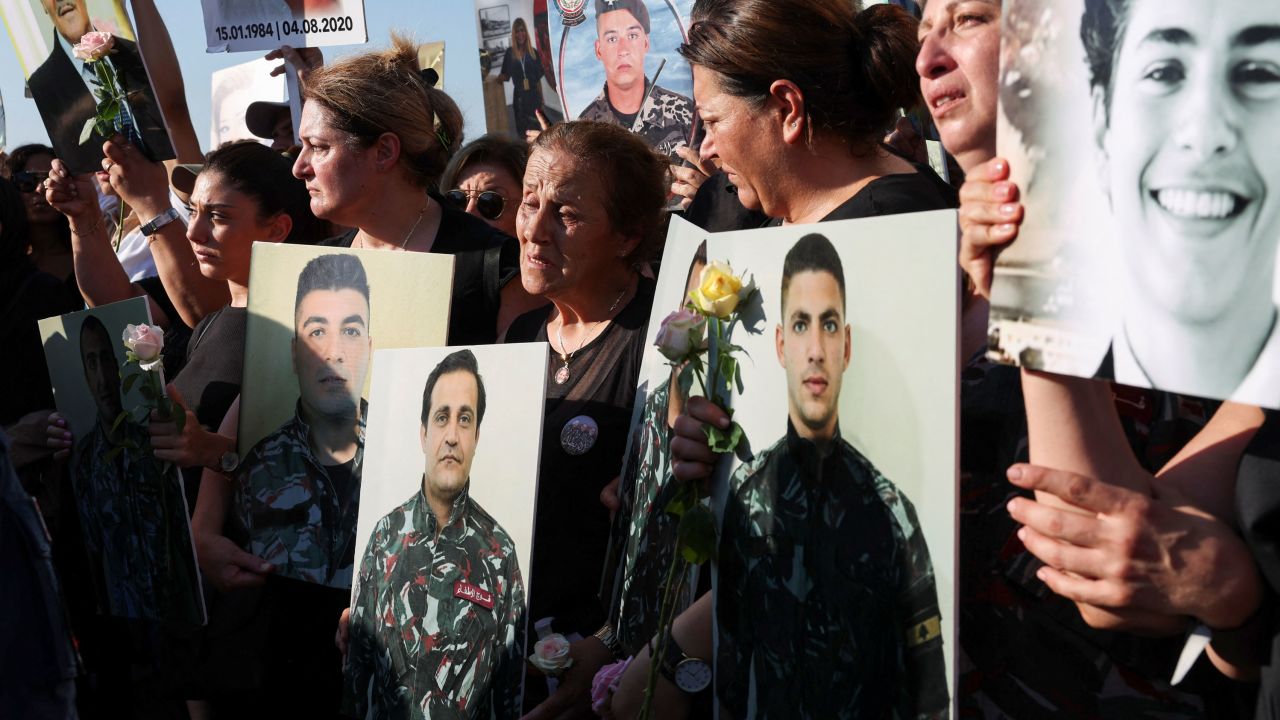
Relatives hold the pictures of some of those killed in the August 2020 Beirut port blast during a march marking the three-year anniversary of the disaster.Emilie Madi/Reuters
But three years on and what caused the ammonium nitrate to ignite remains a mystery.
An investigation aimed at prosecuting several top politicians for criminal neglect has come to a standstill, with activists and legal experts urging the United Nations to initiate a fact-finding mission to uncover the truth.
Earlier this week, caretaker Prime Minister Najib Mikati declared the anniversary of the blast a nationwide holiday.
He also launched a nationwide three-day mourning period for those affected by the blast.
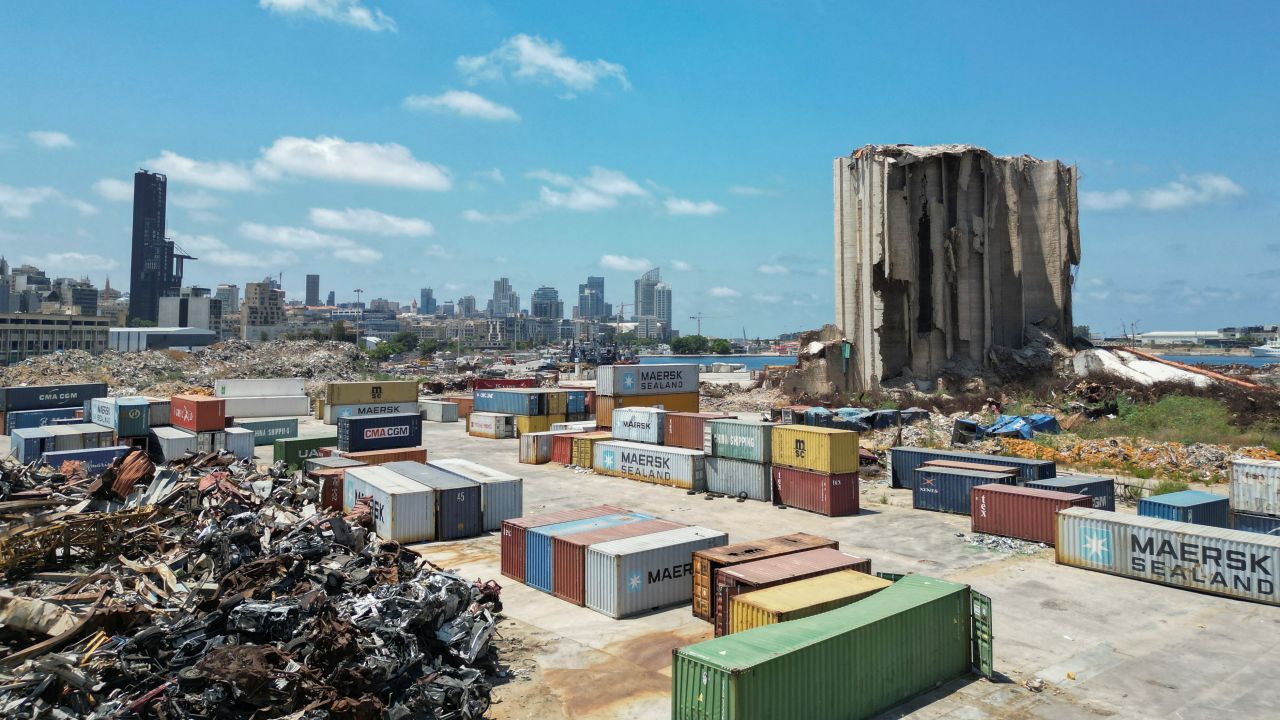
Grain silos damaged in the 2020 Beirut port blast.Emilie Madi/Reuters
“Public institutions and municipalities should close on Friday, August 4, 2023 in memory of the tragedy of the port explosion as a show of solidarity with the families of the innocent martyrs and the injured and their families,” he said.
Enter your email to sign up for CNN's "Meanwhile in the Middle East" Newsletter.
close dialog
Meanwhile, French President Emmanuel Macron has pledged support for the former French colony.
In a tweet Friday, Macron recalled his visit to Lebanon days after the explosion, saying he was “at the side” of the Lebanese people.
“Lebanon was not alone. It still isn’t. You can count on France, our solidarity, our friendship,” the French leader said.
Last month, Macron appointed his former foreign minister, Jean Yves Le Drian, to the role of special envoy to Lebanon as part of France’s effort to end the political deadlock in the country.
BEIRUT (Reuters) - Lebanon on Friday marks the third anniversary of the Beirut port explosion which killed at least 220 people, wounded thousands, and damaged swathes of the city.
Despite the devastation, an investigation has brought no senior official to account. Here is a summary of what happened and how the investigation has been stymied:
THE EXPLOSION
The blast is thought to have been set off by a fire at a warehouse just after 6 p.m. (1600 GMT) on Aug. 4, 2020, detonating hundreds of tonnes of ammonium nitrate.
Originally bound for Mozambique aboard a Russian-leased ship, the chemicals had been at the port since 2013, when they were unloaded during an unscheduled stop.
No one claimed the shipment, tangled in a legal dispute over unpaid fees and defects.
The amount that blew up was one fifth of the 2,754 tonnes unloaded in 2013, the FBI concluded, adding to suspicions that much of the cargo had gone missing.
The blast sent a mushroom cloud over Beirut, and was felt 250 km (155 miles) away in Cyprus.
WHO KNEW ABOUT THE CHEMICALS?
Many Lebanese officials, including then-President Michel Aoun and then-Prime Minister Hassan Diab, knew of the cargo.
Aoun said after the blast he had told security chiefs to "do what is necessary" after learning of the chemicals. Diab has said his conscience is clear.
Human Rights Watch said in a 2021 report that high-level security and government officials "foresaw the significant threat to life ... and tacitly accepted the risk of deaths occurring".

Families of victims of August 4, 2020 Beirut port blast attends a mass on the eve of the third anniversary of the explosion
INVESTIGATION STYMIED
Related video: Beirut firefighters struggle years after port blast (Reuters)Duration 2:08 View on Watch
Ruling factions have big sway over the judiciary, which Lebanon's top judge acknowledged in 2022 in general criticism of the problem.
Judge Fadi Sawan appointed by the justice minister to investigate the blast charged three ex-ministers and Diab with negligence in December 2020. But a court removed him from the case in February 2021 after two ex-ministers - Ali Hassan Khalil and Ghazi Zeitar - complained he had overstepped his powers.

Maronite Patriarch Bechara Boutros Al-Rai holds shakes hands with a family member of one of the victims of August 4, 2020 Beirut port blast, on the eve of the third anniversary of the explosion
Sawan's successor Tarek Bitar sought to interrogate senior figures including Khalil and Zeitar. All deny wrongdoing.
Suspects' demands for Bitar's removal over alleged bias and mistakes have prompted several suspensions of the investigation.
The judges meant to rule on those complaints retired in 2022 and no successors were appointed, leaving the probe in limbo.
In early 2023, Bitar unexpectedly resumed his probe and charged more officials including Abbas Ibrahim, a top security official at the time of the blast.
However, Lebanon's top public prosecutor charged Bitar for allegedly exceeding his powers and ordered the release of people detained since the blast, including the former head of the Beirut port authority, putting the probe on hold again.
HEZBOLLAH'S ROLE
Iran-backed Hezbollah has dismissed public accusations it controls the port or stored arms there and it campaigned against Bitar as he sought to question its allies.
In 2021, a Hezbollah official warned Bitar the group would "uproot" him, and its supporters marched in an anti-Bitar protest that prompted deadly violence in Beirut.

Smoke rises from the partially-collapsed Beirut grain silos, damaged in the August 2020 port blast, in Beirut
Hezbollah has also accused the United States of meddling in the probe. The U.S. ambassador has denied this.

capsized ship is seen at Beirut port
OVERSEAS ACTION
Victims have turned to foreign courts.
Last year, some filed a $250 million claim in the United States against a company linked to the ship.
In June, a London court awarded nearly $1 million in damages to victims. But it was a symbolic victory because the identity of the beneficial owner of a British-registered firm that had sold the chemicals was not disclosed, making it unclear who would pay.
(This story has been corrected to change the judge's name to 'Tarek Bitar' from 'Fadi Sawan' in paragraph 13)
(Writing by Tom Perry, Timour Azhari, Maya Gebeily; Editing by Tomasz Janowski)
Lebanon: Unacceptable lack of justice, truth and reparation three years after Beirut blast
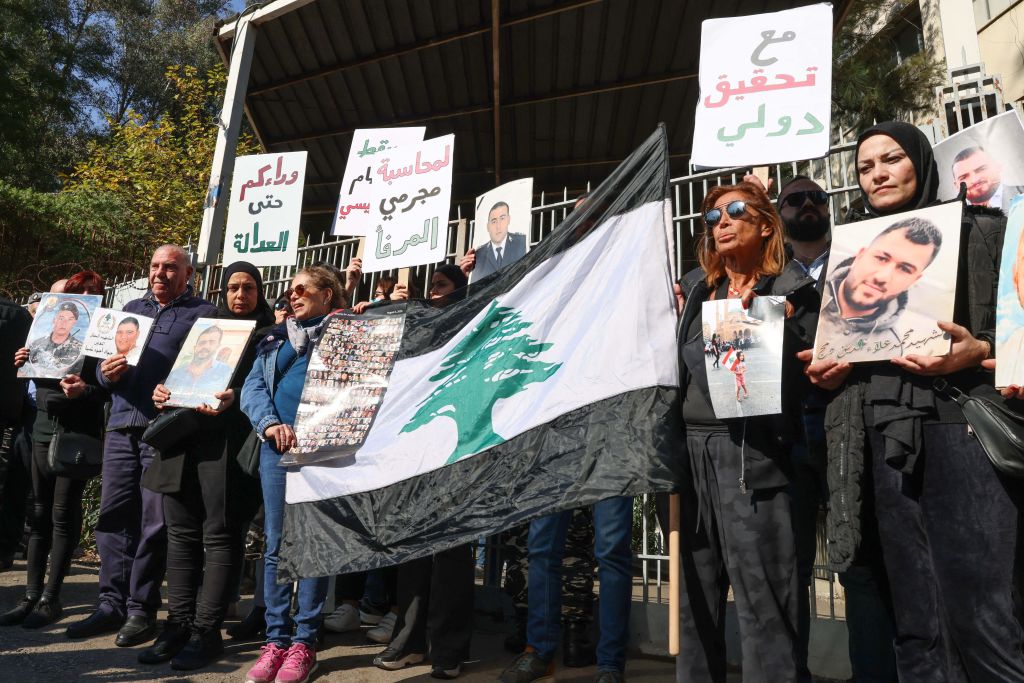
JOSEPH EID/AFP via Getty Images
NEWS
Ahead of the three-year anniversary of the catastrophic explosion in Beirut’s port that killed at least 235 people and damaged more than half of the city, Aya Majzoub, Amnesty International’s Deputy Director for the Middle East and North Africa, said:
“The Lebanese authorities have had three years to investigate what caused the devastating explosion in Beirut’s port and to hold those suspected of criminal responsibility to account. Yet to this day, absolutely no one has been held responsible for the tragedy that unfolded on 4 August 2020.
Instead, the authorities have used every tool at their disposal to shamelessly undermine and obstruct the domestic investigation to shield themselves from accountability – and perpetuate the culture of impunity in the country.
The international community has repeatedly condemned the authorities’ blatant political interference in the domestic investigation, including in a joint statement at the United Nations Human Rights Council earlier this year. Today, over 300 Lebanese and international civil society groups, as well as survivors and victims’ families, are once again appealing to the Human Rights Council to urgently establish an international fact-finding mission to investigate the causes of the Beirut Blast and identify those responsible for the catastrophe.”
“The Lebanese authorities have had three years to investigate what caused the devastating explosion in Beirut’s port and to hold those suspected of criminal responsibility to account. Yet to this day, absolutely no one has been held responsible for the tragedy that unfolded on 4 August 2020.Aya Majzoub, Amnesty International’s Deputy Director for the Middle East and North Africa
Background:
The domestic investigation into the Beirut Blast has been suspended since December 2021 due to a series of legal challenges filed against the lead investigator, Judge Tarek Bitar, and other judges involved in the case by politicians who have been targeted by the investigation.
When Judge Bitar tried to resume the investigation in January 2023, he was slapped with a lawsuit and a travel ban by Public Prosecutor Ghassan Oweidat, who was charged in the port investigation. Oweidat ordered the release of all detained individuals suspected of involvement in the explosion. At least one defendant has since fled the country.
Oweidat’s actions have been deemed illegal by the Beirut Bar Association and the Lebanese Judges Association. However, since then, there has been no progress with the investigation yet to resume.
In March 2023, Australia delivered a joint statement on behalf of 38 states at the United Nations Human Rights Council expressing concern that the domestic investigation into the explosion had been “hampered by systemic obstruction, interference, intimidation, and a political impasse.” The statement called on the Lebanese authorities to abide by their international human rights obligations and safeguard the independence of the judiciary, and to carry out a swift, independent, impartial, credible and transparent investigation.
Probe on the disaster that killed more than 220 people is virtually at a standstill, with original lead investigator Fadi Sawan dismissed from his job after he charged top government officials.

The massive August 4, 2020 blast at Beirut's port destroyed swathes of the Lebanese capital, killing more than 220 people and injuring at least 6,500. (Mohamed Azakir/Reuters File Photo)
Lebanon on Friday marks three years since one of history's biggest non-nuclear explosions rocked the capital, Beirut. Yet nobody has been held to account as political and legal considerations continue to undermine investigation.
On August 4, 2020, the massive blast at Beirut's port destroyed swathes of the Lebanese capital, killing more than 220 people and injuring at least 6,500.
Authorities said the disaster was triggered by a fire in a warehouse, where hundreds of tonnes of industrial chemical ammonium nitrate, originally bound for Mozambique, had been haphazardly stored for years.
Three years on, the probe is virtually at a standstill, leaving survivors still yearning for answers and wondering who knew about the existence of the stockpile of explosive materials.
The main activist group representing families of those killed has called for a protest march on Friday afternoon, converging on the port.
"This is a day of commemoration, mourning and protest against the Lebanese state that politicises our cause and interferes in the judiciary," said Rima al-Zahed, whose brother was killed in the explosion.
"The judiciary is shackled, justice is out of reach, and the truth is shrouded," she said.
The blast struck amid an economic collapse that the World Bank has dubbed one of the worst in recent history and which is widely blamed on a governing elite accused of corruption and mismanagement.
Since its early days, the probe into the explosion has faced a slew of political and legal challenges.
In December 2020, lead investigator Fadi Sawan filed charges against top government officials, but his action led to his dismissal instead.
'Culture of impunity'
His successor, Tarek Bitar, unsuccessfully asked lawmakers to lift parliamentary immunity for MPs who were formerly ministers. Now he is also facing accusations of bias and dismissal calls.
The interior ministry has refused to take action on arrest warrants which the lead investigator has issued.
Adding to the mystery were revelations that about 80 percent of the explosive chemicals are still missing, and that only a fifth of the 2,754 tonnes originally seized and unloaded in 2013 blew up during the disaster.
In December 2021, Bitar suspended his probe after a barrage of lawsuits, mainly from politicians he had summoned on charges of negligence.
But in a surprise move this January, Bitar resumed investigations after a 13-month hiatus, charging eight new suspects including high-level officials.
In response, he was charged with insubordination and "usurping power", and ordered the release of all those detained over the blast.
Bitar has refused to step aside, yet has not set foot inside Beirut's justice ministry building for months.
"Work (on the investigation) is ongoing," said a legal expert with knowledge of the case, requesting anonymity due to the sensitivity of the matter.
Bitar is determined to keep his promise to deliver justice for victims' families, the expert added.

A view shows the partially collapsed grain silos, damaged in the August 4, 2020 Beirut port blast as Lebanon marks third anniversary of the explosion on Friday.
'We will get the truth'
Some victims have turned to foreign courts.
Last year, some filed a $250 million claim in the United States against a company linked to the ship.
In June, a London court awarded nearly $1 million in damages to victims. But it was a symbolic victory because the identity of the beneficial owner of a British-registered firm that had sold the chemicals was not disclosed, making it unclear who would pay.
Zahed, whose brother died in the blast, said: "The truth does not die so long as there is someone to demand it.
"We believe that we will get the truth."
On Thursday, 300 individuals and organisations including Human Rights Watch (HRW) and Amnesty International renewed a call for the United Nations to establish a fact-finding mission, a demand local officials have repeatedly rejected.
"International action is needed to break the culture of impunity in Lebanon," HRW's Ramzi Kaiss said in a statement.
Amnesty's Aya Majzoub accused authorities of using "every tool at their disposal to shamelessly undermine and obstruct the domestic investigation to shield themselves from accountability".

Family members of a firefighter who was killed during August 2020 Beirut port explosion react during a memorial ceremony, at a fire station in the Lebanese capital on Wednesday, August 2, 2023. (Mohamed Azakir/Reuters)
SOURCE: TRTWORLD AND AGENCIES
Beirut blast 3 years on

As 4 August comes around again, so do the memories for the Naggear family. On that date in 2020, the windows in the Naggears' apartment, located in the Beirut neighbourhood of Gemmayzeh, just up the hill from the port, shattered and burst following a huge explosion in the Lebanese capital.
Tracy Naggear and 3-year-old Alexandra were badly injured. A few days later the preschooler, nicknamed Lexou, died in hospital. "We are not good. It's been three years now and it's as if nothing has happened, as if our daughter was just taken like this by chance, and nobody cares," Paul Naggear says.
The child was one of the youngest victims of the port explosion, which eventually claimed the lives of more than 220 people. Thousands more were injured and 300,000 people were displaced after 2,750 tons of ammonium nitrate blew up in what was one of the largest non-nuclear explosions ever recorded. The ammonium nitrate had been improperly stored in a Beirut port warehouse for six years.

located in the Beirut neighbourhood of Gemmayzeh, just up the hill from the port,
burst following a huge explosion in the Lebanese capital. Tracy Naggear and
3-year-old Alexandra were badly injured. A few days later the preschooler,
nicknamed Lexou, died in hospital. "We are not good. It's been three years now
and it's as if nothing has happened, as if our daughter was just taken like this
by chance, and nobody cares"
Blast investigation stalled
For a long time, the Naggears found it impossible to return to their apartment in Beirut because of the emotional pain, fear and memories; everything about the place hurt for them.
So they moved to Beit Mery, in the hills east of Beirut. On top of the anguish that the explosion had caused, the family has also had to deal with worsening political and economic chaos in Lebanon. The country is dealing with an economic crisis that the World Bank classifies as one of the 10 worst in the world since the 19th century. Lebanon also doesn't have a president right now.
The Naggears eventually moved back into their Beirut apartment at the end of 2022. "We've been trying to put our life back together for a while," says Paul Naggear, an architect. "And I think we're doing better now." The couple are still fighting for accountability for Alexandra, though.
Hardly a day passes when the Naggears don't meet with the relatives of other victims also engaged in the same fight. "You have to find your own ways to get justice," Naggear says. "It's not a human right in Lebanon. So it's very, very tough for us to bear."
Blaming political elite
Three years on, nobody has been held accountable, despite the fact that there is evidence that Lebanese officials and politicians were implicated in the root causes of the explosion. "Unfortunately the investigation into the port explosion has been suspended for a long time in Lebanon," says Lina Khatib, director of the Middle East Institute at SOAS University in London and an associate fellow at Chatham House.

Political elite seek to suppress inquiry led by Judge Tarek Bitar: the investigation was suspended in 2021, after complaints were filed against Bitar by officials summoned for questioning. "Judge Tarek Bitar is being attacked because he was indicting and incriminating members of the political elite in the August 4 blast," says Diana Menhem, head of Kulluna Irada, an advocacy group for political reform
Khatib is talking about the investigation into the explosion led by Judge Tarek Bitar. Families like the Naggears were optimistic that Bitar, who comes from Akkar in the north of Lebanon and who had a reputation for being incorruptible, would help them. Lebanon doesn't have a good track record of holding criminals to account, but Bitar's investigations had seemed to be moving in the right direction. In a rare February 2021 interview with the French-language Beirut newspaper L'Orient-Le Jour, Bitar had said the investigation was a "sacred" cause for him.
But there have been many obstacles for Bitar. The investigation was suspended in 2021, after complaints were filed against Bitar by officials who had been summoned for questioning. However, the complaints could not be heard at the court of cassation because the relevant judges retired and were not replaced.
In October 2021, the case caused protests in Beirut, some of which became violent. "Judge Tarek Bitar is being attacked because he was clearly indicting and incriminating members of the political elite in the August 4 blast," says Diana Menhem, head of Kulluna Irada, an advocacy group for political reform that is supported financially by Lebanese people from both inside and outside the country.
When Bitar tried to restart the investigation in January 2023, Lebanon's top prosecutor, another judge, Ghassan Oweidat, said Bitar was doing so despite the unresolved legal challenges. Oweidat also said Bitar was overstepping his judicial authority and issued a travel ban against him. Oweidat also ordered that everyone detained in connection with the investigation so far should be set free again.
Threats to Bitar
"The investigation is stalled because of politically motivated judicial delays that aim to absolve members of the political establishment from accountability," Khatib says. "Leading political figures in Lebanon from across the spectrum do not want to see the investigation yield fruit. And that is because most people who have links with the port explosion, whether directly or indirectly, happen to be from this circle of political leaders."
There are also increasing concerns about threats to Bitar's life. Lebanon has a long history of politically motivated assassinations that have never been cleared up.
Victims' families still pushing for accountability: attempts to restart the investigation in January 2023 were blocked by Lebanon's top prosecutor Ghassan Oweidat, who issued a travel ban against Judge Bitar and ordered everyone detained in connection with the investigation be released. "Such delays aim to absolve members of the political establishment from accountability," says Chatham House fellow Lina Khatib. "Leading political figures in Lebanon from across the spectrum do not want to see the investigation yield fruit"
Paul Naggear also hopes that Bitar can continue his investigations without being targeted. "That would be terrible," he says.
Families of victims, rights groups and some politicians are pursuing multiple routes in their quest for justice. For example, they have requested that the United Nations set up a special international investigation into the exposition.
"An international investigation could establish the facts and circumstances, including the root causes, of the explosion", Human Rights Watch wrote in February 2023. "It could also establish state and individual responsibility and support justice efforts and reparations for the victims".
Another possibility for justice involves civil lawsuits against the responsible parties. One in the United Kingdom has already been successful. It charged a London-registered chemicals trading firm, Savaro Ltd., that was suspected of having chartered the 2013 shipment of ammonium nitrate that ended up exploding in Beirut in 2020. In February 2023, a British court decided in favour of the three families of victims who were involved.
"The ruling gives us hope because it's been the only first step towards getting some justice in this case," Naggear says.
There may be more to come. The Swiss foundation Accountability Now and other victims' families have filed a lawsuit against the U.S.-Norwegian geophysical services group TGS. The company reportedly owns the firm that sub-chartered the ship carrying the ammonium nitrate back in 2012. The lawsuit was filed in Texas.

A failed state in so many ways: with a sectarian political system fraught with cronyism and corruption and an economy that has collapsed as a result, the outlook for Lebanon is bleak. "Lebanon is currently in a state of despair," Khatib continues. "People have almost lost hope that the state will be able to deliver on even their most basic needs"
'State of despair'
Three years ago, Lebanon's relatively well-off middle class might have been able to focus on pursuing justice. But now many Lebanese people are fighting for economic survival. "Lebanon is currently in a state of despair," Khatib says. "People have almost lost hope that the state will be able to deliver on even their most basic needs."
The Naggears feel that way. They have since welcomed a baby son to their family, but they no longer feel safe in Lebanon and are trying to spend as much time as possible in nearby Cyprus. They say they will keep fighting for justice for their lost daughter, even though they know that will be difficult to achieve as long as the corruption and cronyism in Lebanon's political system continues. They also still want to win more supporters to their side in their struggle.
"Of course, we will continue our fight indefinitely," Naggear says, "until we get truth and justice for our daughter."
© Deutsche Welle 2023
US decries 'lack of progress' toward justice 3
years after Beirut port explosion
Victims, their families deserve justice and accountability for
Firdevs Bulut Kartal |04.08.2023 -

TORONTO
The "lack of progress" towards ensuring accountability for the devastating explosion that upended Beirut three years ago "is unacceptable," the US State Department said on Friday.
"The lack of progress towards accountability is unacceptable and underscores the need for judicial reform and greater respect for the rule of law in Lebanon," spokesperson Matthew Miller said in a statement.
"The victims and their families deserve justice and accountability for those responsible for the disaster and the underlying causes," he added.
Beirut was rocked by a massive explosion on Aug. 4, 2020 that killed more than 200 people and injured 6,500 others. About 50,000 housing units suffered damage, with property damage estimated to cost $15 billion. It is considered to be the largest non-nuclear explosion ever recorded.
Lebanon's highest court decided in January to release all suspects arrested as part of the investigation into the explosion. Ghassan Oweidat, Lebanon's chief prosecutor, went on to file charges against the judge leading the investigation into the massive blast.
The actions were taken two days after judge Tarek Bitar resumed his inquiry into the deadly blast following a 13-month suspension prompted by political resistance to his attempts to question top officials.
LA REVUE GAUCHE - Left Comment: Search results for BEIRUT

